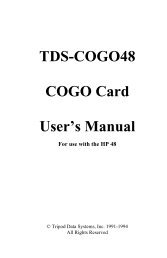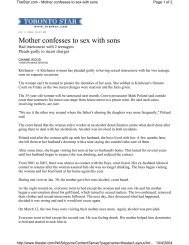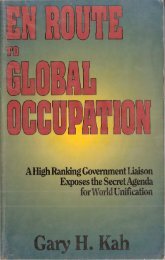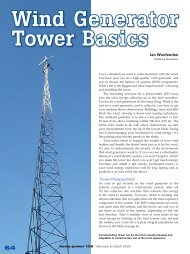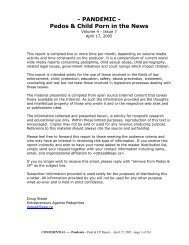G. Edward Griffin - The Fearful Master - PDF Archive
G. Edward Griffin - The Fearful Master - PDF Archive
G. Edward Griffin - The Fearful Master - PDF Archive
You also want an ePaper? Increase the reach of your titles
YUMPU automatically turns print PDFs into web optimized ePapers that Google loves.
where they quickly received official accreditation. <strong>The</strong> Soviets lost no time in announcing<br />
to the world that they now recognized Gizenga's regime as the "only legitimate<br />
Government of the Congo." 3<br />
With this background in mind it may still come as a shock to some to recall that at this<br />
point the United Nations swung its full support and influence behind Gizenga and did<br />
everything it could to hamper Colonel Mobutu and President Kasavubu. This is doubly<br />
hard to justify because Mobutu and Kasavubu represented the central government, which<br />
had called in the United Nations in the first place. Gizenga's little Communist satellite of<br />
Orientale province was just as much secessionist as Katanga province had been. But the<br />
United Nations made no effort to end Gizenga's secession. It passed no angry resolutions<br />
in the Security Council. It initiated no massive troop movements. In fact, as has been<br />
pointed out, it used what few troops it did have in Orientale province to protect Gizenga<br />
and his followers. Stewart Alsop, writing in the Saturday Evening Post, described it this<br />
way:<br />
<strong>The</strong> United Nations policy has been, in essence, to immobilize the<br />
forces controlled by the Kasavubu-Mobutu regime. . . . Dayal [United<br />
Nations representative in the Congo] has ruled that Mobutu's army<br />
should be permitted to make only minor troop movements. . . . With the<br />
Kasavubu-Mobutu forces thus effectively hamstrung, and with help from<br />
Egyptians and iron curtain money and technicians, Gizenga's rump pro-<br />
Communist regime quickly consolidated its position. . . . Gizenga's<br />
forces then began moving on neighboring Kivu and Katanga provinces.<br />
<strong>The</strong> troop movements were by no means minor by Congolese<br />
standards, but the United Nations did nothing. . . . Mobutu was certainly<br />
a sad and harried man when I saw him. If the United Nations under<br />
Dayal had not actively obstructed every move be made, he said, he<br />
could have dealt in fairly short order with the Stanleyville dissidents. 4<br />
While all this was going on, Moise Tshombe was making efforts of his own to reunite the<br />
Congo along the federal lines previously discussed. On February 28 he met with a<br />
representative of the central government and one from Kasai province. <strong>The</strong>re was<br />
immediate agreement on basic principles and the conference ended with all three signing<br />
a mutual defense pact to prevent the establishment of what they referred to as a United<br />
Nations "regime of tyranny." 5 On March 8 Tshombe convened a second conference, this<br />
time expanded to include virtually every Congolese leader of importance except the<br />
Communist Gizenga. Complete agreement was reached in record time. At the conclusion<br />
of the third day, the conferees issued a communiqué revealing that they all endorsed<br />
Tshombe's basic plan calling for a "community of Congolese states." <strong>The</strong>re was to be a<br />
central government at Leopoldville in a neutral zone similar to the District of Columbia.<br />
Kasavubu was to remain president, serving on a council of states made up of the<br />
presidents of the member states. Foreign policy, a general internal policy, currency and<br />
military affairs would come under jurisdiction of this council of states. <strong>The</strong>re were to be no<br />
customs or immigration barriers between the states. It was obviously fashioned very<br />
closely after the American pattern of government. In a final telegram to Dag<br />
Hammarskjold, the Congolese leaders warned that the dispatch of more UN troops to the<br />
Congo would "aggravate tension" between the United Nations and the Congolese<br />
population. Tshombe said at the conclusion of the conference, "We have resolved our<br />
problems ourselves and now we want both West and East to leave us alone." <strong>The</strong> Soviet<br />
news agency Tass responded by denouncing the meeting as "a conference of puppets<br />
and traitors." 6


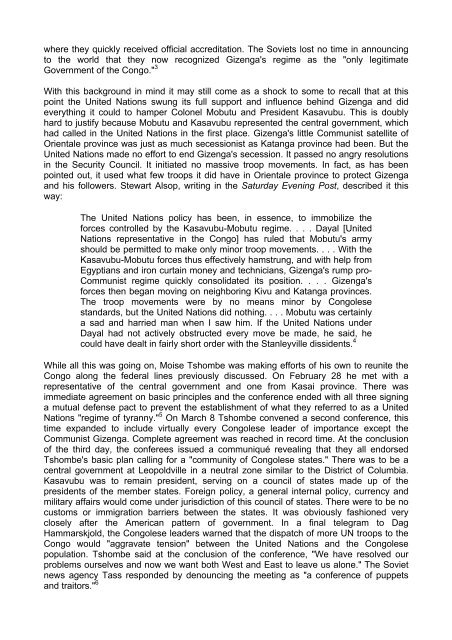
![Robert T McQuaid [rtmq@stn.net] Sent: Friday, October 29, 2004 12 ...](https://img.yumpu.com/51070071/1/190x245/robert-t-mcquaid-rtmqstnnet-sent-friday-october-29-2004-12-.jpg?quality=85)

